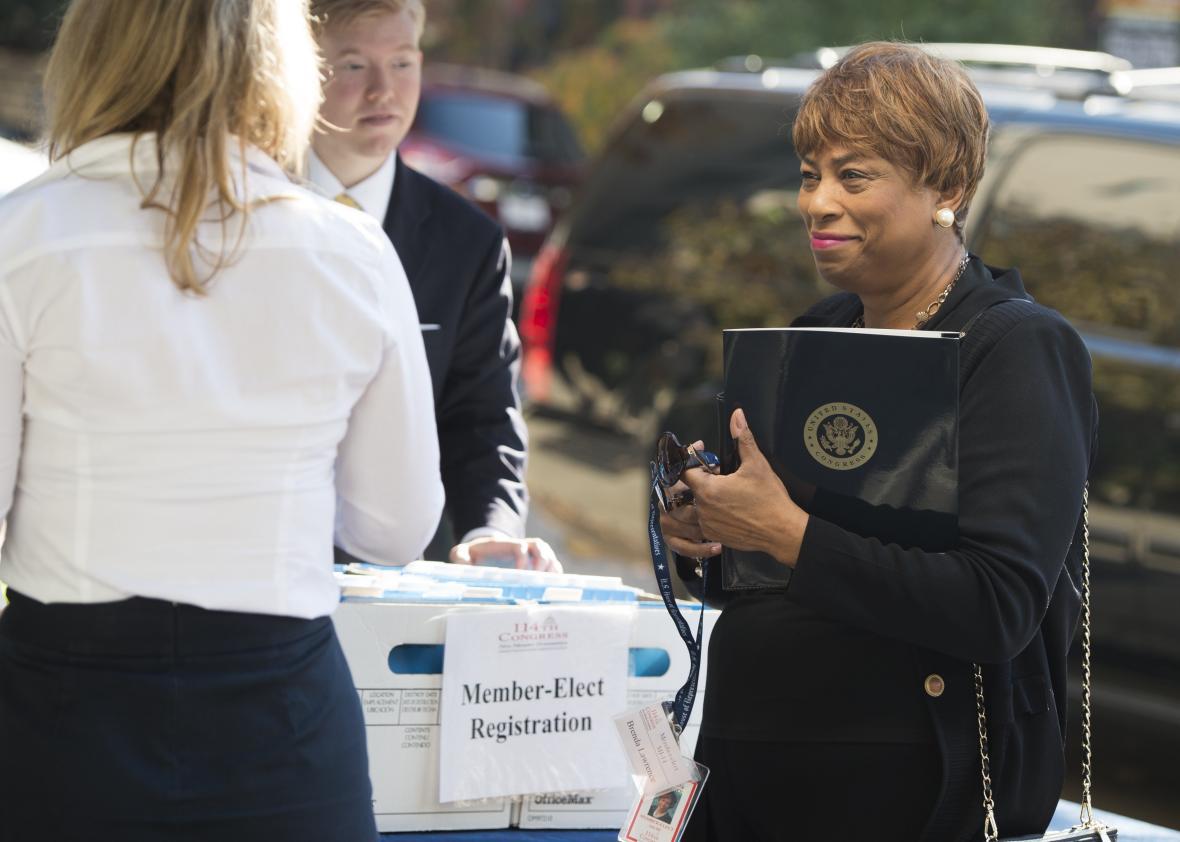Rep. Brenda Lawrence, one of the legislators working to stop sexual harassment on Capitol Hill, apparently helped perpetuate misconduct in her own office, according to a report from Politico. Lawrence, a former federal human resources officer, recently sponsored a bill to make biannual sexual harassment training mandatory for congressional office employees, but she retained her chief of staff despite several aides’ complaints about his workplace behavior.
“You have to set a tone. You have to establish this benchmark of zero tolerance,” Lawrence told ABC’s This Week in late October. But the congresswoman, who’s represented Michigan’s 14th District since 2015, tolerated chief of staff Dwayne Duron Marshall’s allegedly inappropriate conduct. According to reporting by Politico’s Rachael Bade, Marshall would comment on female employees’ appearances and dating lives or scold them if they wore flats instead of heels. Ex-employees recall him saying that specific job applicants weren’t attractive enough to be hired. Other allegations include unwanted shoulder massages and touching staffers’ necks or waists. Two of the women claim he grabbed another staffer’s midsection and said she was gaining weight.
Bade’s piece cites three former staffers who say they personally complained to Lawrence about Marshall’s behavior, two of whom told her he was the reason for leaving their jobs. Subsequently, the congresswoman asked employees whether they also had concerns about Marshall; at least one aide said yes and mentioned that other staffers shared her feelings. However, Lawrence kept Marshall on her payroll and only acknowledged to Politico having “management-style issues” with staffers. “I want to be very clear, very firm, that I had no knowledge of any allegations of sexual harassment in my office,” she said. After the article’s publication on Tuesday, Lawrence put Marshall on administrative leave and told the Washington Post she “will not tolerate” sexual harassment, still denying any prior knowledge of it. (For his part, Marshall denied having committed sexual harassment and decried the allegations as “slanderous” in a brief statement.)
The former aides reject Lawrence’s blanket denial, telling Politico the representative is “complicit” and “completely full of shit.” While none of the women explicitly used the term “sexual harassment” in their conversations with Lawrence, they said, they made clear their discomfort with his behavior around them or other women, and one complained to the congresswoman specifically about Marshall’s untoward comments and physical contact. Lawrence herself confirmed to Politico that she would classify rubbing a colleague’s shoulders—which Marshall apparently did—as harassment.
This is a particularly awkward scandal for Lawrence, because she once worked as a human resources executive for the U.S. Postal Service and touted her credentials as a “certified Equal Employment Opportunity investigator for a federal agency” when introducing a bipartisan bill that would make biannual sexual harassment training mandatory. (Currently, some congressional offices opt to show a 30 minute training video, but unlike cybersecurity and ethics training, it is not required.)
In the wake of the Harvey Weinstein scandal, numerous revelations of sexual misconduct in legislatures from statehouses to the U.S. Capitol have prompted bipartisan denouncements of the behavior and calls for more stringent rules. Politicians (and former staffers) from both sides of the aisle have pushed legislation to quash sexual harassment on Capitol Hill. Last week, D.C. Rep. Eleanor Holmes Norton, a former chair of the Equal Employment Opportunities Commission, debuted a bill that would extend the protections that apply to federal and private employees to congressional hires. Rep. Jackie Speier, who recounted her own story of being forcibly kissed by a congressional chief of staff in 1970, introduced a bipartisan resolution that would require annual sexual harassment training for all Congress members and employees. (Speier has tried unsuccessfully to pass similar bills each year since 2014.) And Sen. Kirsten Gillibrand announced Friday that she will author a bill that would not only mandate training but also change the way Congress’ little-known HR equivalent, the Office of Compliance, handles sexual harassment. Her press release proposes, for example, removing the 30-day “mediation” victims must undergo before filing a complaint, publicly posting employee rights in congressional offices, and extending Office of Compliance resources to interns.
Speaker of the House Paul Ryan wrote to his members and urged them to implement sexual harassment training in their offices. Fellow Republican Sen. Chuck Grassley, who crafted the 1995 law responsible for Congress’ current workplace complaint system, sent a letter to the Senate Rules Committee requesting that it immediately require sexual harassment training for employees (but not members).
These measures address a larger pattern of harassment in politics; a July survey found that while one in six female aides had personally experienced workplace sexual harassment, only one in 10 were aware of the systems to report it.
“I am a firm believer that the conversation changes when a woman takes a seat at the table,” Lawrence said last month in a speech at the Women’s Convention in Detroit. But the alleged misconduct taking place in her own office is a reminder that electing women to positions of power will not, by itself, instantly eliminate sexual harassment. It’s too pervasive a problem.
